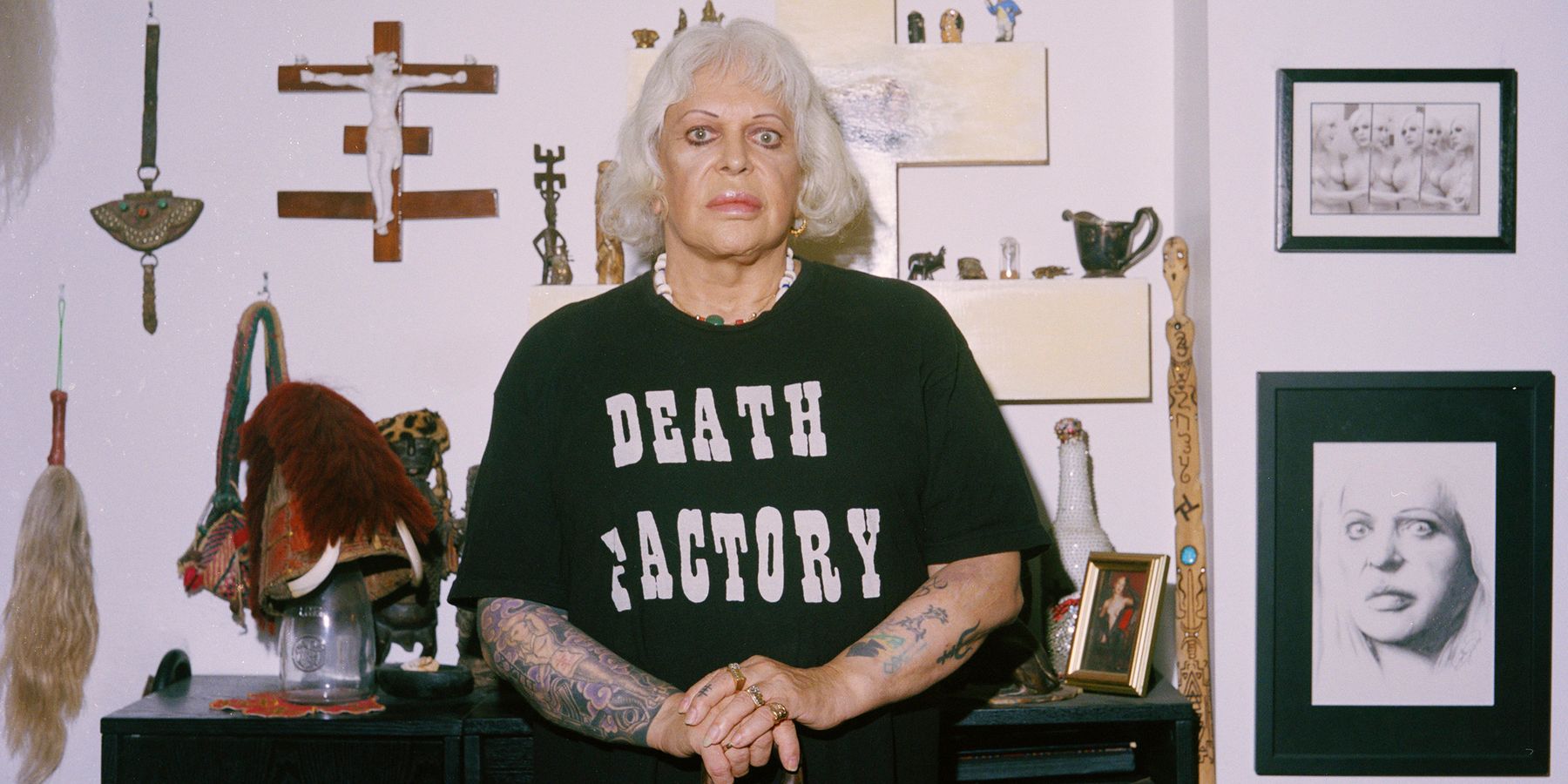
Transformation
Genesis P-Orridge: Stormtrooper of the Future
Story by Michael Love Michael / Photography by Serena Jara
29 March 2019

What do you write about someone who has seen and done it all, been through hell and back, currently lives between heaven and hell, and has become an absolute legend in their lifetime? This is the challenge of profiling the prolific and transcendent Genesis Breyer P-Orridge, who has created 300 albums of genreless, but no less influential, music and art — both solo and in bands like Throbbing Gristle and Psychic TV — since he/r teens, growing up in England.
I'm 30 years old, and identify as non-binary. S/he is 69, and has created he/r own category to encapsulate he/r singular experience of gender, called "pandrogeny." I want tattoos, but fear the pain of a needle. S/he not only has numerous tattoos, but has fearlessly gone under the knife so that s/he could become he/r late partner, the artist Lady Jaye. I have, thus far, been in love with one person that I hoped would last forever, and they could be dead for all I know. Though P-Orridge says Lady Jaye has "left he/r body," s/he was and remains the love of he/r life. P-Orridge even went to Benin, Africa to have Lady Jaye properly immortalized in the form of a figurine that s/he talks, consults, and prays with daily.
Though it may seem we have very little in common, P-Orridge and I are ultimately bonded by love — a religion so powerful, it works with or without faith.
---
Love is sacred, P-Orridge tells me, and s/he knows this because s/he lives it. There are many examples in art and culture supporting this idea, but even if it is promoted, how widely is it accepted, and then, actually practiced?
Queer musicians such as Olly Alexander have written songs about the sacrament of love like in Years & Years' "Sanctify." Lana Del Rey's entire discography is, by this point, an iconic, repetitive time-warp capturing the pitfalls and triumphs of practicing love as devotion. Reality shows from The Bachelor to Flavor of Love depict competitive, conditional love afforded by the monetary gain of its contestants. Spiritual guru Marianne Williamson teaches weekly courses based on the seminal A Course In Miracles text, in which she proffers the virtues of a much-needed — and much-lost — "return to love."
When P-Orridge was 17, s/he recorded he/r first album while enrolled at a West Midlands, England private school, and was enduring bullying. Back then, the music s/he made was "terrible," but it was an exorcism of personal demons. In art and the occult, s/he found a sacred calling, and the ability to express "exceptional revelations," to "inspire everyone else to understand themselves a bit better" — a type of love both selfless and, ultimately, unconditional.
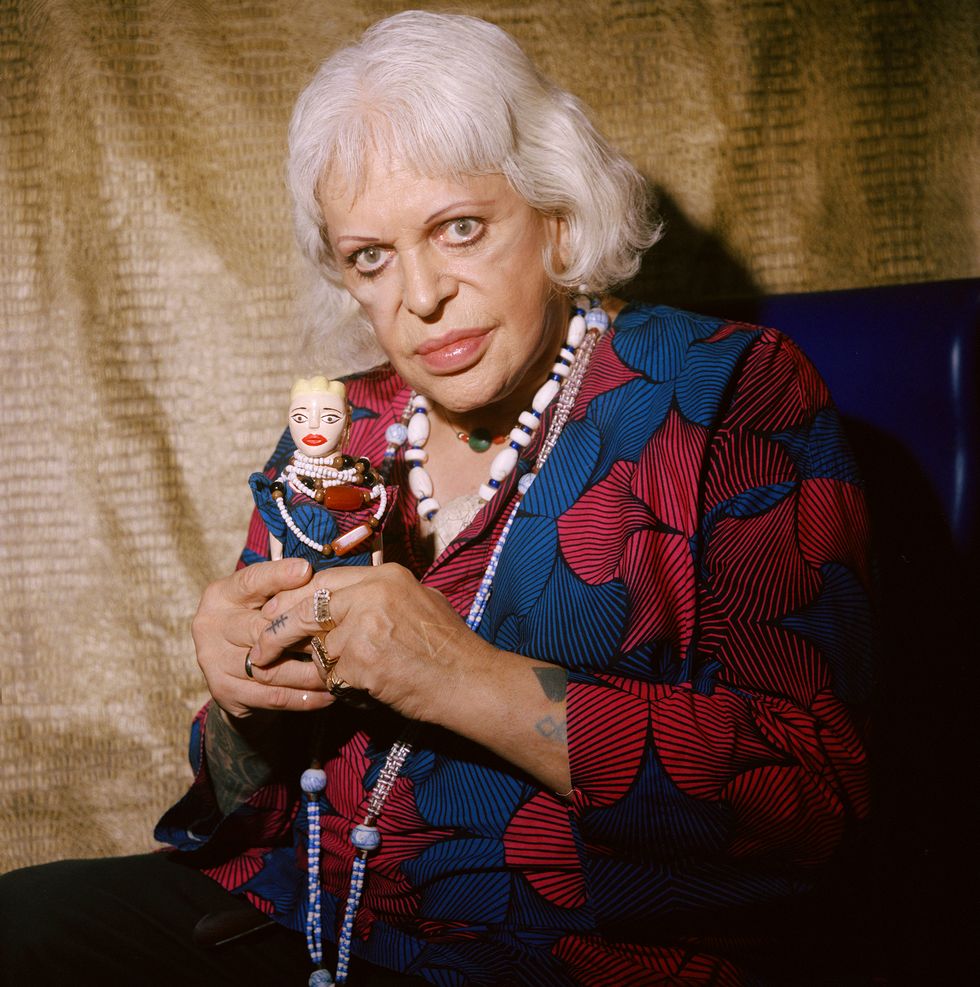
Lady Jaye & Genesis P-Orridge (Photography: Serena Jara)
P-Orridge continued to make music and tour the world. Combating Christian dogma and the church's oppression of people for centuries, s/he created Thee Psychick Bible, which outlined TOPY's guiding principles, "occulture" texts, and he/r own observations on the subject of love as the sole answer to a world perpetually in manmade crisis. It has been translated to many languages, including Spanish, French, and most recently, Russian.
P-Orridge has lived long enough to see types of social progress in he/r home country of England, and in America, where s/he has lived since the '90s. S/he witnessed and closely followed the Civil Rights Movement of the '60s, and seems to have always been guided by the principles of love as a tool for progress. S/he co-founded in the '80s a radical group, Thee Temple ov Psychick Youth (TOPY), for those seeking individual liberation through community-building and magic. Unlike the cult it was publicly accused of being, the group consisted of "only leaders, and not followers," according to P-Orridge. TOPY's very existence made he/r a target for the English government, and following a raid about 10 years later, s/he decamped to the U.S.
Consider government leaders throughout history who have risen up against radical artists and activists like P-Orridge — people using their bodies to make bold anti-establishment statements, often by literally putting their money where their mouths are. Consider the rise of Trump in America, and his insistence on finding ways to oppress the most marginalized among us, from divisive rhetoric and promoting various forms of LGBTQ discrimination to separating families at our borders. Voices like P-Orridge's have staked their reputations and legacies on promoting unity, as afforded by love of one another, even as s/he criticized "thee [sic] sleeping masses."
Upon realizing s/he was an artist, P-Orridge believed he/r role was "to care for others, altruistically."
"It's what you can give back to the species, in the hope that it improves everybody's experience of being alive," s/he says. "And the body is not the person." As Lady Jaye used to say, "The body is a cheap suitcase that carries around the consciousness." The body may wear out or betray itself until someday it is discarded, but consciousness doesn't.
In recent years, P-Orridge has endured a prolonged battle with leukemia. Earlier this year, s/he said he/r live shows with Psychic TV in Europe would likely be he/r last, after touring and playing for 50 years. Whether you find inspiration or repulsion from he/r art and beliefs, what does it mean to lose a voice like P-Orridge's? While s/he is still here, he/r revolutionary thoughts on what motivates us — gender, body, politics, money, love —all matter. And they will continue to once he/r physical body is not here.
---
Today, P-Orridge is very familiar with the body's inevitable self-destruction, as if s/he weren't before, having surgically altered he/r entire body to match the love of he/r life as an artistic project and an exploration of what the body can handle. Because if it really is just a cheap suitcase, as Lady Jaye once said, you can decorate it how you like — adding or subtracting items as needed in the name of enhancement.
P-Orridge wrote a book detailing the whole thing retrospectively. It's a thick, hardcover assemblage of intimate photographs and essays called S/HE IS (STILL) HER/E. Sitting in he/r Lower East Side home, I'm flipping through copy 647 of only 1,323 printed editions while also reading news items about he/r battle with leukemia, which began in the 2017 while on tour with Psychic TV. Seeing photos of fluid drainage from he/r lungs on Instagram, all while watching he/r take breaths from oxygen tanks in he/r living room is surreal. S/he's in high spirits, but also in a great deal of discomfort.
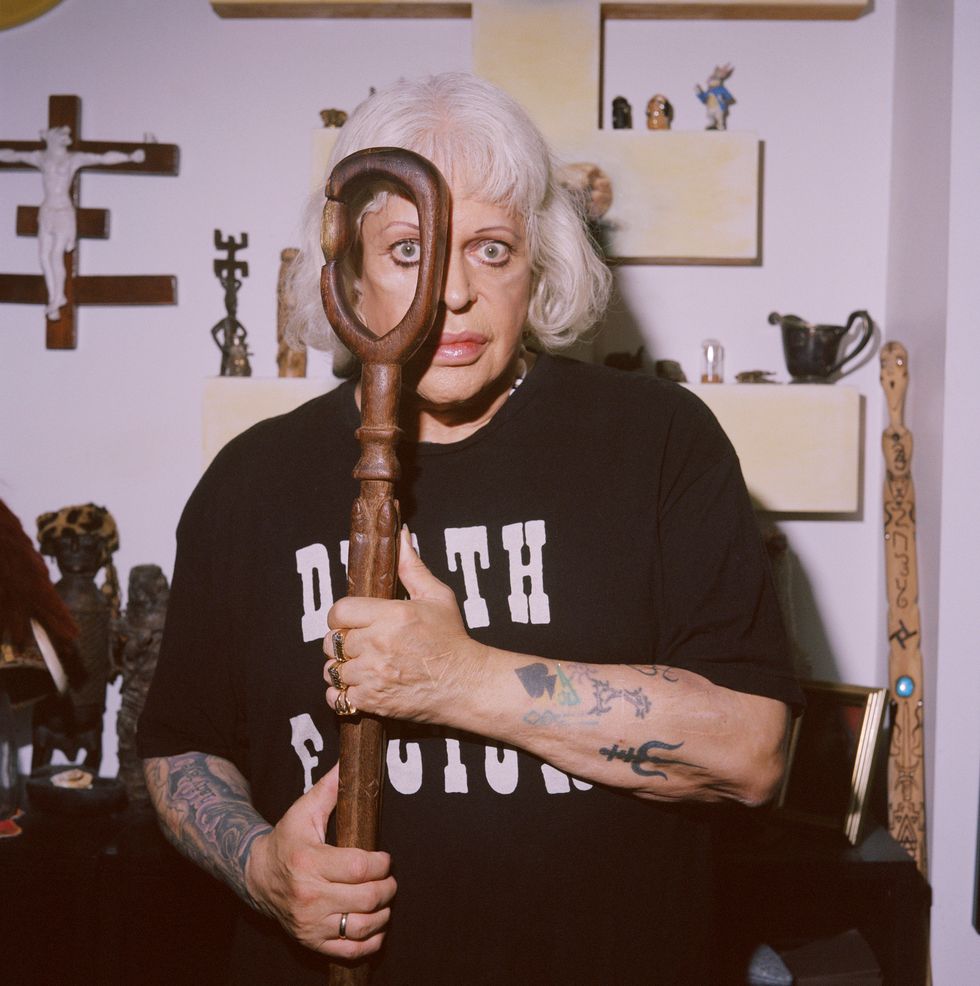
Genesis P-Orridge (Photography: Serena Jara)
In S/HE IS STILL HER/E, P-Orridge elaborates on pandrogeny, created after s/he met Lady Jaye in 1993. "Thee body has been at thee centre of all art. It's thee great mystery of existence, thee body versus death, thee mortality fear that runs so deep. While it's there, have fun with it. Fuck you, DNA!" In one black-and-white post-op image, s/he writes: "We never felt we were physically attractive. It took Jaye a couple of years to persuade me that s/he meant it when s/he said we were beautiful. S/he's thee only person who's told me that we're beautiful and we've believed it. No one else — not my kids, my parents, no one."
Considering all the physical transformations s/he has undergone, whether intentionally or naturally, P-Orridge says that the body is a vessel, but not how organized religion might teach. "You get these holdovers that still get repeated in society today: 'Your body is a temple, and it must be kept clean and pure!' and we say to that, 'Well, why do we want it to be such?'" s/he says. "Isn't the body really just another tool for which you can experience sensation? At its best, the body is good for sensation. And mobility. Until it isn't."
Perhaps when a person is dying, they become clearer not only on deciphering their own lives, but the world around them — something P-Orridge has spent he/r whole career exploring, from the disastrous state of climate change to American political uproar du jour. What seems to be keeping he/r alive is generosity, from within and outside the self. P-Orridge tells me that a GoFundMe, started by fans and friends to help cover medical expenses, raised around $62,000. "It saves my ass to this day," s/he says. "It is still so moving to know that my cancer diagnosis revealed how deeply people care for and trust me." Optimism, despite he/r health challenges, is also keeping P-Orridge going. "We will always report back as best we can on any given health situation, we will look for the best way to explain it. Now: would you like some tea?"
As P-Orridge prepares English-style tea with milk and honey, I notice the Psychic TV crosses and other occult memorabilia lining the walls of he/r studio apartment. There are serpentine walking staffs and symbols representing the number 23, which holds special significance to P-Orridge. In numerology, it is often cited as a number representing freedom and fluidity with deep spiritual and religious context. In Christianity, Psalm 23 is often invoked as a sort of "last rites" passage: Though I walk through the valley of the shadow of death, I will fear no evil.
It is the sacred number of Eris, the goddess of discord. In Islam, the Quran was revealed over the course of 23 years to Prophet Muhammed. For P-Orridge, the number 23 dates back to he/r fellowship Thee Temple ov Psychick Youth. It's a number of sacred ritual designed to achieve a deeper understanding of self, in order to be serviceable to others. But also, 23 is the number of typical chromosomes found in human sex cells. Our scientific understanding of sex has evolved over the past century to include sexes that go beyond X for female and Y for male.
This nuanced understanding of sex and gender is what P-Orridge has always represented and advocated for.
---
The most instant way to understand P-Orridge's ideas of gender fluidity is through the surgically altered love story of P-Orridge and he/r beloved "other half" Lady Jaye. The long story starts like many a love at first sight tale — like, "truly, unconditionally in love. And obsessed," P-Orridge says. The two met in the early '90s when P-Orridge watched transfixed as Lady Jaye paced back and forth in a basement chain smoking. Lady Jaye was a registered nurse. They soon embarked on cross-country road trips and art-making around the world, together.
This romance developed until the couple wished to be fully absorbed into each other's lives. For millennia, this wish has been at the center of how many couples define and solidify their unions, for better or for worse. In the biblical story of Adam and Eve, which P-Orridge specifically cites, God created Adam, then fashioned Eve from his rib or the side of his flesh. P-Orridge believes this original, divine state of humanity of one being part of another, is what "we've been seeking to return to." As Christians worship the story of creation, for P-Orridge and Lady Jaye, becoming each other in the flesh was their own divine ritual.
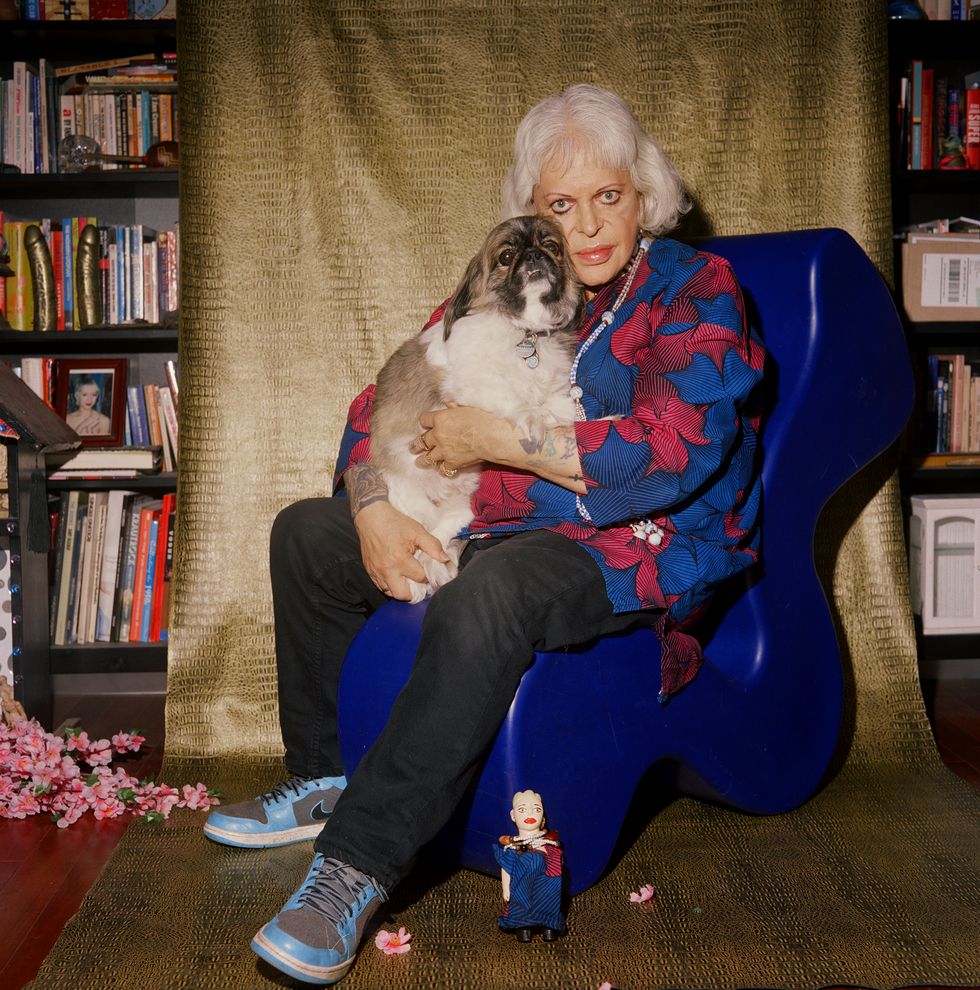
Musty Dagger & Genesis P-Orridge (Photography: Serena Jara)
"It's not male or female, not either/or — just complete," P-Orridge says. "We thought it was important to remind people of that idea, and as artists, we figured the best way to do so was visually. The body has always been the subject in art, from the get-go. If we are going to survive as a species, we have to stop the endless cycle where someone must be scapegoated, then attacked and destroyed — whether it's within groups, in society or in a war for land. How do we start to change human behavior, so that it's not being governed by being trained to hate what's different, when we are all unified, and already complete? Hating what's different, what we don't understand, over and over again, and thus not being unified — that is perhaps the original sin."
After a life-threatening house fire in California, a court case with producer Rick Rubin, and paying off medical bills from injuries P-Orridge sustained from the fire, s/he and Lady Jaye reviewed what was left over financially to begin their series of surgeries.
"We had about $650,000 left," s/he explains. "We thought, we could be sensible and put this in a bank or a 401k and not have to worry about bills for a long time, and live a comfortable, safe life. Or, we could decide that this lump of money gives us the freedom to not have to work at all, and spend it all on making art and creating new options and possibilities. We looked at each other and realized we may never get that chance again." As Lady Jaye once said, "See a cliff, jump off."
Upon finalizing calculations and risk assessment, P-Orridge says that s/he and Lady Jaye came to an agreement. Considering the procedures they wanted to undergo to match one another, the process would take up to 10 years. Having also survived raids in he/r Brighton home of he/r life and work archives, following accusations of "satanic abuse" of "cult members," which were later disproven, the 1995 marriage of P-Orridge and Lady Jaye gave rise to a third form of being. Padrogeny was born between the two of them as a holistic way of life by doing as well as believing. "It's a word with no baggage or political association," P-Orridge says. "It doesn't even have to entail gender. We are at a point now where we can decide we want to have green skin or fur all over us, or I would love to be able to have gills and live underwater. It's only our imaginations that limit what our bodies can become."
In S/HE IS STILL HER/E, there are photos of P-Orridge and Lady Jaye in identical hair and makeup, nude or clothed. Lady Jaye taught P-Orridge to love hair salons, about wearing sexy heels and shoes that you could also run to catch a bus in. He/r favorite image of shoes were the Yves Saint Laurent heels worn by Catherine Deneuve in the French 1967 classic Belle de Jour, which were dragged through the mud after Deneuve was untied from a tree. P-Orridge and Lady Jaye shared shoes; their natural size was a women's 7.5.
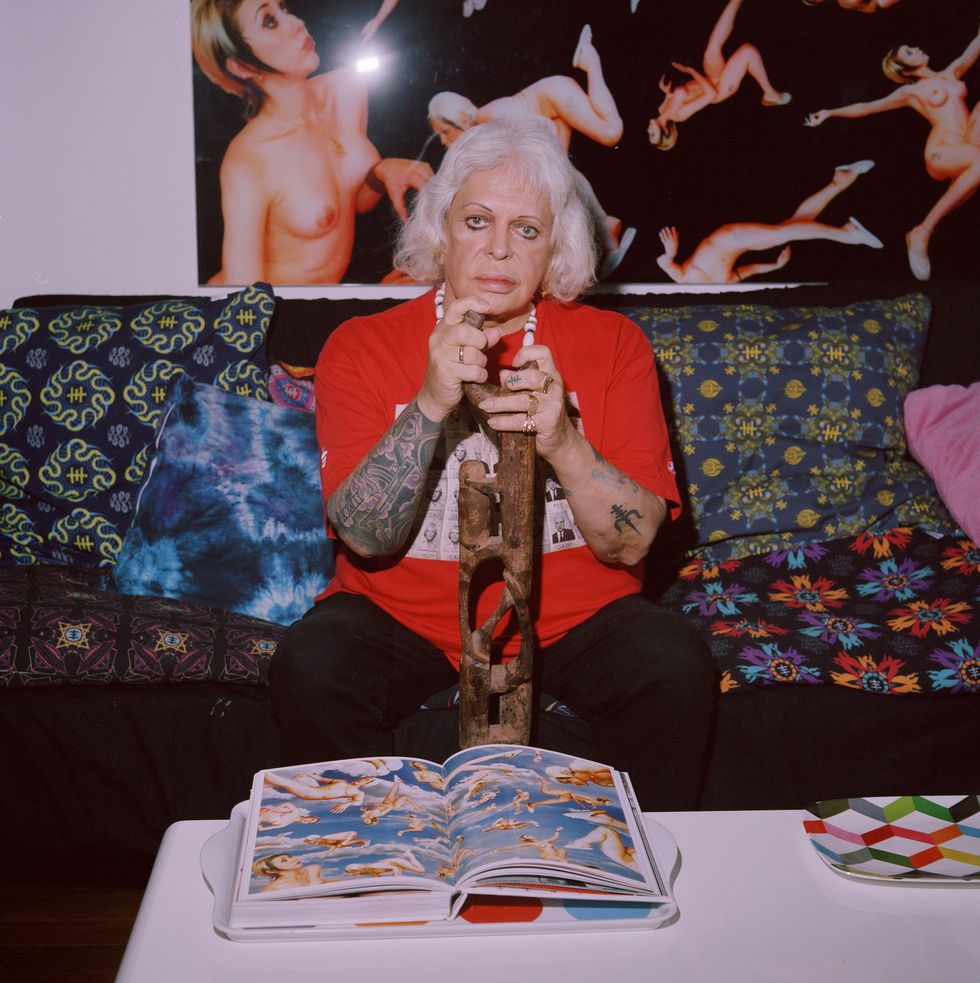
Genesis P-Orridge (Photography: Serena Jara)
As a nurse, Lady Jaye was able to film the face and implant surgeries P-Orridge underwent. There are photos of P-Orridge with needles in he/r penis, and penis pumps attached to he/r breasts, and close-ups of Lady Jaye's removal of varicose veins. Both of their heads are wrapped in post-op bandages as they wear furs. After both getting 60 sets of lip injections at $700 per visit, P-Orridge got a metallic mouth, inspired by actor Pierre Clementi's metal teeth in Belle de Jour. The dentist's invoice was more than $38,000. He/r dentist told her s/he had the "Rolls-Royce of mouths."
The graphic images of transformation, P-Orridge says as I flip through the book, are only terrifying if you haven't yet come to terms with the fact that underneath our clothes, we are all naked. "In evolution, mutation is law. And who says that we're finished evolving?" P-Orridge says. "There have been papers found by Stephen Hawking where he's saying we'll be superhumans in the future, and yet, it has taken how many hundreds of thousands of years to become what we are now? People are scared of breastfeeding, of sexual activity, of evolving. How will those in power react when someday people go, 'I'm gonna have four horns and two dicks'?"
---
P-Orridge and I continue talking about the environment, magic, twins, and how grief has transformed he/r. After Lady Jaye died, P-Orridge wanted to put an offering into the Ganges river in Nepal, one of their favorite places together. The water of the Ganges is said to be sacred too. A year later, a longtime friend and collaborator, Hazel Hill McCarthy III, suggested P-Orridge take a trip to a coastal town in Benin called Ouidah — an area known both for its voodoo festivals celebrating high priests and priestesses, and its unusually high population of twins. Globally, the number of twins born per every thousand births is seven. In Benin, that number is 32.
When P-Orridge immersed he/rself in the culture, s/he learned that the people of Ouidah believe twins can be born from different mothers. It was decided then that Lady Jaye was P-Orridge's twin. Every year the town hosts a twin festival that lasts two weeks: the first week honors twins who have died, and the second honors those who are still alive. During this time, P-Orridge says s/he and McCarthy were invited to participate in a special ceremony by the town's high priestess of twins. There, songs were sung for Lady Jaye in he/r honor, and a doll was fashioned in he/r likeness, which P-Orridge carries in a pouch and gives food and water. It is her way of maintaining contact with the love of he/r life. The process helped he/r realize that grief can be celebratory. I watched the whole experience with P-Orridge, captured in an hour-long documentary by McCarthy called Bight of the Twin.
"You know, in the West, it's almost a matter of shame," P-Orridge says, holding Lady Jaye close to he/r bosom between sips of oxygen from an air can. S/he exhales: "You're not supposed to bother people with the fact that someone has died. You're supposed to feel like it's your fault — that grief is something to be ashamed of, because now everyone feels awkward around you. But in Benin, they say, 'They're still alive. Here they are.' You still talk to them because they are still around. That's a much more positive and healthy way to deal with someone dying, don't you think?"
---
Well into the afternoon, we begin staging a few photos of P-Orridge with he/r monk-like Pekingese dog, Musty Dagger, who once belonged to a member of the Smashing Pumpkins, and was taken in to ease the grief of losing BigBoy, the dog s/he owned with Lady Jaye. Since this interview, Musty Dagger has died, or as P-Orridge would say, "Dropped the body."
After a few shots, Musty Dagger grows restless. P-Orridge sets he/r eloved pet down and joins me on he/r couch. P-Orridge and I shift to activism, and how people seem to be more mobilized than ever since Trump became President. We discuss Trumpian politics and how rapidly news spreads through social media to fuel out fears. Of course, P-Orridge is quick to remind me that though Americans are currently sucked into this vortex, the fight against such fear is as ancient as patriarchal rule itself. It's not just the government we're fighting against, s/he says.
"I've always felt like there's nothing more precious than fighting for the world — for the species," s/he says. "It has always seemed like the only option. They, meaning the people in control — which is partly the government, partly bigger corporations, partly bigots, and party organized religion — want to continue to control by pitting us against each other. And control needs time, like a junkie needs junk. Control runs by perpetuating itself."
How do we break free from the prison of our 24-hour news cycle, I ask he/r. It seems everything we consume is designed to make us feel hopeless. And that's because, P-Orridge says, "it is."
But change, as we've seen through history, happens in stages. S/he explains it in circular language: because when we don't learn from the past, the worst parts of history and mankind's influence of it, repeat themselves — again and again.
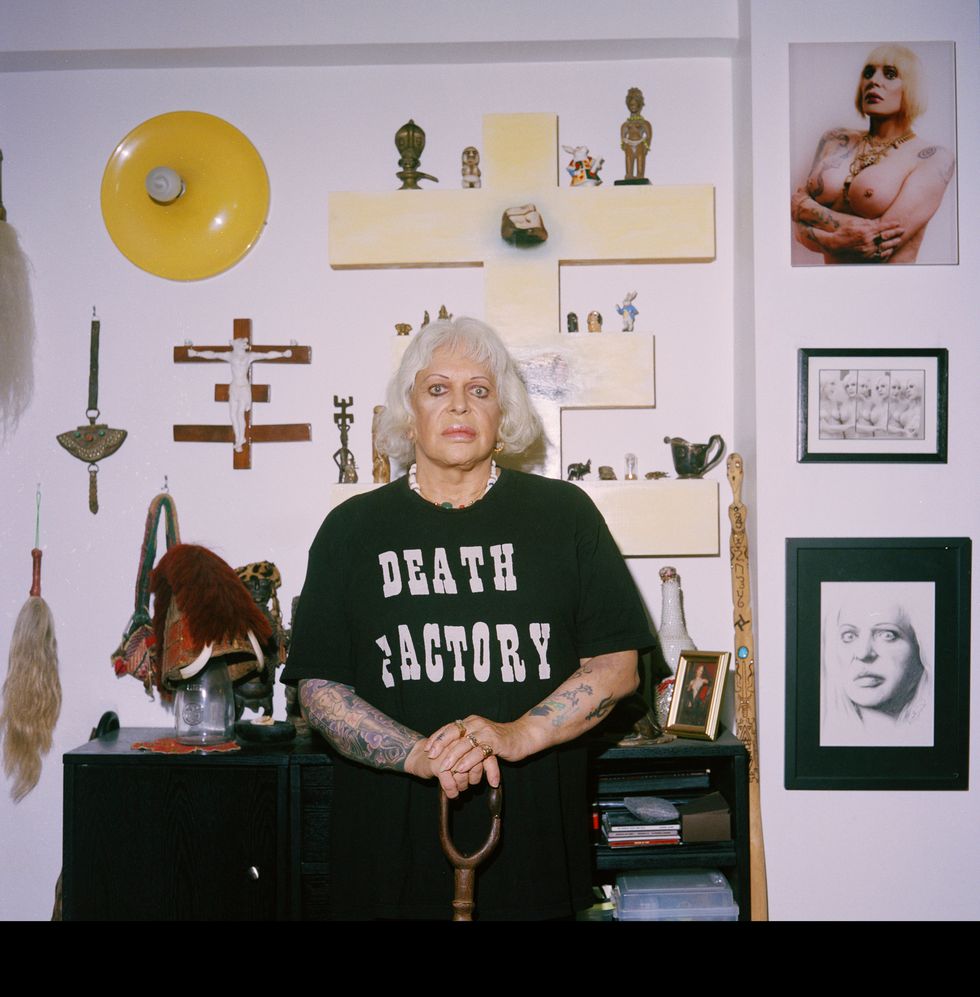
Genesis P-Orridge (Photography: Serena Jara)
"First you change yourself, then you change your bedroom, and then you change your house, and then you change the street you live on, and then you change the area you live in, and then you change the town," P-Orridge explains. "It's incremental, in other words. You just change the bits you can."
S/he continues: "But then you'll notice that when you've changed your house, the person next door has changed theirs, and then you get together and you both change the street. And then, all the people on the street think, 'Let's change this town.' So, that's where optimism comes in. You also find out who else is an activist, who has realized similar things, and has a similar desire to guide the future differently."
P-Orridge shares a recent example of how s/he has had to advocate for he/rself, while on tour with Psychic TV. At a Phoenix stop, s/he got a call saying the band's gig might need to be cancelled. The Sisters of Perpetual Indulgence had announced they were going to protest at the venue due to a policy stating that trans people couldn't use the restroom they felt was appropriate.
"So we rang the club, and spoke to the guy who ran it, and we said, 'This is impossible,'" P-Orridge says. "He goes, 'Oh, don't worry. You can use my private toilet. You don't have to use the men's toilet.' And I said, 'Well that's even worse.' You're giving me this special privilege as though you pity me? Is it a pity bathroom or is it because you don't want to lose any money? It's not acceptable." The band cancelled the show and moved to another club in Phoenix. At the next place, Psychic TV was told by club owners they couldn't perform because of the building owner's religious views. If Psychic TV played there, the club could be shut down.
During that same trip, the final try for a Phoenix show was in a biker bar. "It was fabulous," P-Orridge recalls. "There was no AC and it was a red moon outside. Halfway through the gig, we said 'fuck it' and tore our shirts off and went topless. Then the audience followed suit, and it became this amazing, weird mix of people who had their breasts removed, people who had normal breasts, people who are just growing breasts, and so on. It was brilliant."
Before the show, having caught wind of Psychic TV's difficulties in securing a venue to play in, an ABC News crew approached P-Orridge and asked he/r to comment about the discrimination s/he experienced, and why s/he had such strong views about it. "I looked right in the camera, and said, 'Transsexuals are the stormtroopers of the future.'"
---
That line rings in my head days after our six hours together, and I call P-Orridge again. "It is up to you to make sure you make a difference," s/he reminds me over the phone.
I tell he/r that I am feeling hopeless about an anti-trans memo that Trump released last October. In the memo, the Department of Health and Human Services outlined a biological, old-world definition of sex and gender arguing that both exist within a binary based on "immutable biological traits identifiable by or before birth." There within, the memo also discussed eliminating prior steps forward for trans healthcare, housing, and other means of social support services. It would also institute archaic practices such as sex testing, based on one's birth-assigned genitalia, and using birth certificates to definitively decide someone's gender.
I mention that there is a protest against the memo starting in Union Square, and that I feel too tired to go — something many of us experience these days, and often use as an excuse. Not missing a beat, P-Orridge hears the notes of resignation in my voice and calls bullshit. S/he's right.
"Go out and fight for what you believe in," s/he says. "Who cares that you're tired? You still can, so why not do it? It's a shame to sit around waiting for change when we can do something about it. Because the truth is, the majority who have somehow colluded in this power system are equally to blame for where we are now. Everyone who didn't bother to vote is to blame, as well."
I'm reminded of a chance encounter with P-Orridge on the Lower East Side about a month before this interview. S/he came into a Mexican restaurant wearing a "Thank God For Abortion" T-shirt by Viva Ruiz, portable air tank in tow. S/he walked with the support of one of he/r many wood-carved walking sticks. As I approached he/r, wanting to say hello, s/he ordered a stiff drink. I asked if I could sit and chat with he/r for a moment, which stretched into hours.
Only a week prior, s/he had been in the hospital getting large sacs of fluid drained from he/r lungs. S/he talked about fear that the country could, at any moment, become a totalitarian police state. S/he spoke about physically fighting evil forces who threatened he/r, so I cautiously brought up he/r perilous health condition. S/he looked at me with an expression that was peaceful, but unflinching. "It's a tragedy, where we are," P-Orridge said, trailing off. "I wonder if I'll be here to watch."
If s/he's still fighting, for life, for love, for humanity — why can't we?
Photography: Serena Jara (@serenajara_)